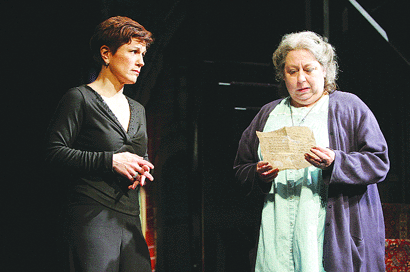Probing the warped juncture of health and hypochondria
“Why can’t you make yourself well?” the tearful, exasperated Lisa Kron asks her mother towards the climax of “Well,” her comic bio-play that she initially denies is about herself, or her mother.
Not the most burning question theater has ever tackled. Yet Kron, known as one of the “Five Lesbian Brothers,” makes the issue of wellness surprisingly relevant in her highly personal, inventive comedy that just landed on Broadway. “Well,” which enjoyed a triumphant run at the Public Theater in 2004, is gleefully billed as “a solo show with other people in it.”
Sporting a severe black pantsuit and sharply cropped auburn hair, the deadpan playwright-performer recites her goal from an index card at the top of the show. She declares the work a “multi-character theatrical exploration of issues of health and illness both in the individual and in a community.”
By offering glimpses from her childhood, the 45 year-old Kron hopes to elucidate why some people get sick and then get better, while others spend their entire lives in a chronic miasma of unwellness, dragging down everyone around them. Her rotund, gray-haired mother, Ann, who reclines in an overstuffed La-Z-Boy lounger in her cluttered living room that consumes much of the stage, repeatedly disrupts Kron’s careful construct, much to her daughter’s ire, and to our delight.
The central joke of the play—and it’s often very funny—is that Kron’s take on her childhood, albeit boiled down for dramatic purposes, increasingly bears little resemblance to the truth as her mother saw it. Ann blames all of her ills on “the allergies.” Kron blames her ills, well, on her mother.
Indeed the play itself, despite Kron’s best-laid plan, deconstructs before our very eyes. Ann talks over scenes, actors break character and eventually stage a revolt against the author. First the “fourth wall” and then, literally, the back wall, come tumbling down.
The intrepid Kron quips, “This avant-garde meta-theatrical thing will just bite you in your ass.” Pirandello would surely be amused.
A lively supporting cast of four (Daniel Breaker, Saidah Arrika Ekulona, John Hoffman, Christina Kirk) play multiple roles dramatizing key moments. We see flashbacks of Kron as a teenager in a special facility to treat victims whose lives have been commandeered, and often crushed, by allergic reactions beyond their control. Kirk is especially fine as Kron’s mirthlessly moribund roommate.
We also observe the efforts of the cutting-edge neighborhood association, which helped shape the Kron household, a white family living in a mostly black section of Lansing, Michigan.
As the evening unfolds, Ann proves to be much more than the hypochondriac sloth slumped in a recliner watching VCR tapes of ice skating. In the 1960s and 1970s she was a social maverick, despite her maladies, single-handedly creating the vital association that unified the races in her community. Unheard of in those days.
Ann’s living room, packed to the rafters with gizmos and knickknacks, is actually a marvel of ingenuity. When an actor—who has abandoned their character—asks for tips about a health topic, Ann reaches into her file box and whips out a photocopy of just the right article. The warmth of a mother’s love is felt by all—except, of course, her demanding daughter. Kron refers to her mother as a “housewife savant” and it’s not entirely a compliment.
When the actors begin to favor the mother’s caring eccentricity over the daughter’s methodical bossiness, Ann explains, “She’s more used to the one-woman shows.”
Though it makes sense that Lisa Kron plays herself, it’s a bit of a shock to learn that Ann is played by an actor, Jayne Houdyshell. Truly a sensation, she fits into the role as comfortably as she does that La-Z-Boy recliner. Listen for her name for best supporting actress at Tony Award nomination time.
Two seasons ago, when “Well” premiered Off Broadway, it was a bracing whiff of fresh air. The clunky, experimental nature of the piece, and Kron’s offhand, stilted delivery seemed pitch perfect. On a Broadway stage, however, the material is spread so thin that, at times, it feels transparent and strained. What seemed cute before now registers as cutesy. Perhaps this is a byproduct of Leigh Silverman’s tentative direction.
But these are minor quibbles. “Well” remains a vibrantly amusing portrait of integration—whether it’s blacks with whites, illness with wellness, mother with daughter, or fact with fiction.
So whose reality is the right one, mother or daughter? Smack in the middle, I suspect. Though not the most satisfying of answers, like a doctor’s vague diagnosis of an obscure allergy, it will have to suffice.
gaycitynews.com


































